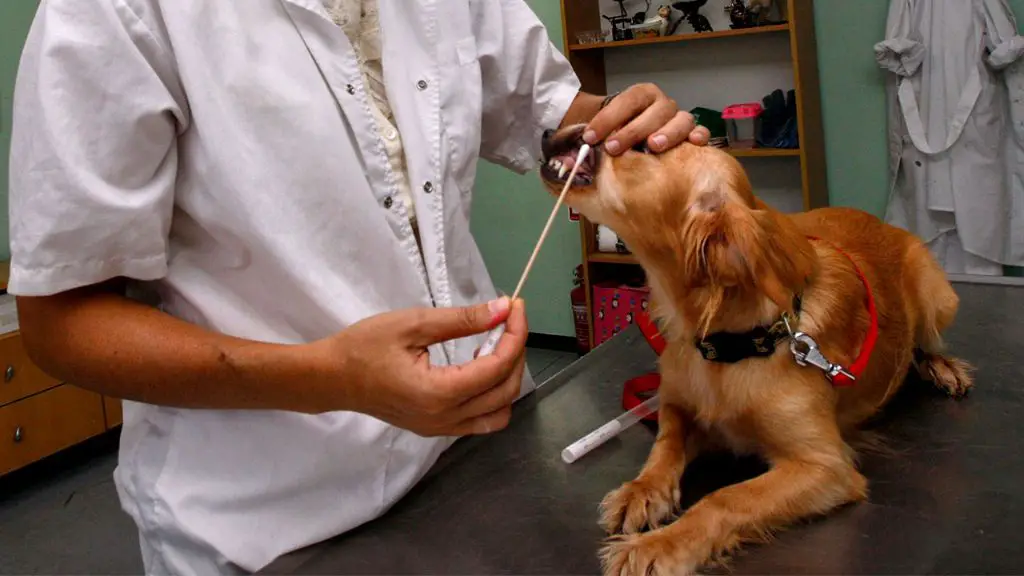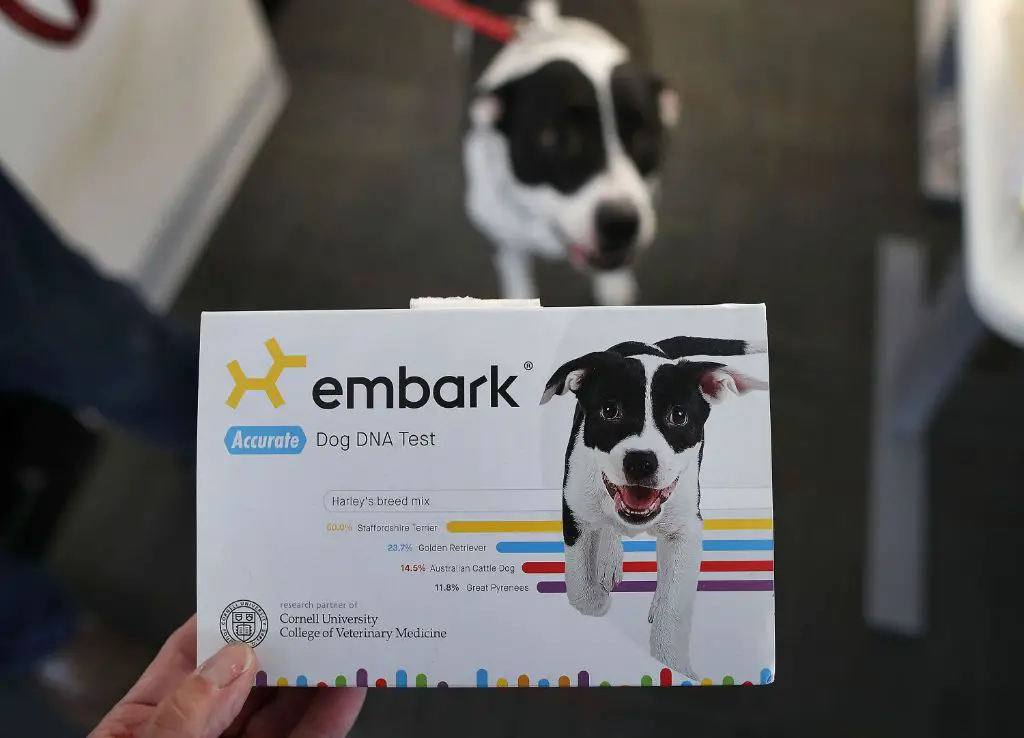Introduction
At-home dog DNA tests have become increasingly popular in recent years. These tests allow dog owners to submit a DNA sample from their pet in order to uncover information about their breed composition and other genetic insights without needing to visit a veterinarian or lab. There are a variety of options on the market, but most at-home dog DNA tests fall into three main categories:
Breed identification tests are designed to pinpoint the breed makeup within a dog by comparing their DNA to breed standards in the testing company’s database. This allows owners to satisfy their curiosity about their mixed breed dog’s heritage.

Health screening tests scan for genetic markers associated with increased risk for certain health conditions and diseases that dogs may be predisposed to based on their genetics. This empowers owners with preventative care insights.
Personality tests claim to provide insight into a dog’s inherent traits and attributes. Though less scientifically proven, these tests aim to predict behaviors and temperament based on breed-associated genes.
At-home testing provides a convenient way for dog owners to discover more about their pet’s background and genetic predispositions without extensive veterinary procedures.
Types of At-Home Dog DNA Tests
There are three main types of at-home dog DNA tests available to pet owners:
Breed Identification Tests
Breed identification or ancestry tests are the most common and affordable type of dog DNA test. These tests analyze your dog’s genetic markers to determine what breeds are in their ancestry. Some tests can identify over 350 dog breeds in your pet’s makeup going back to their great-grandparents. These tests give you insight into your dog’s genetic history and what breed traits they may have inherited.
Health Screening Tests
Genetic health screening tests check for breed-specific disease markers and mutations. They can test for over 150 genetic health conditions like progressive retinal atrophy, degenerative myelopathy, and dilated cardiomyopathy. While not diagnostic, these tests indicate if your dog is at risk for developing certain inherited conditions.
Personality Tests
Relatively new to the consumer market are genetic personality tests for dogs. These tests claim to provide insights into your dog’s traits, needs, and behaviors. Some test for over 150 attributes related to trainability, exercise needs, friendliness, aggressiveness, and more. However, many experts argue that a dog’s personality depends more on environment and training than genetic predispositions.
Breed Identification
Dog DNA tests for breed identification work by analyzing your dog’s genetic markers across its genome and comparing them to breed-specific genetic signatures in the testing company’s proprietary database.
These tests scan for thousands of genetic markers called single nucleotide polymorphisms (SNPs) that can signal different breeds. The more breeds that are detected in your dog’s DNA, the more accurate the test.
Breed identification from an at-home dog DNA test can be helpful but has some limitations:
- Most tests can only detect pure breeds going back 3-4 generations. After that, the breed mix becomes too diluted.
- The available genetic signature databases are still incomplete. Rare or uncommon breeds may not be detected.
- Results may vary between different test brands depending on their breed databases.
- Visual identification of breed mixes can be unreliable. DNA tests provide more accuracy.
- Some breeds are genetically very similar and hard to distinguish. Results may report a related breed instead.
- Breed identification is most accurate for first generation crossbreeds. The more generations since purebred ancestors, the less certain the results.
Overall, at-home dog DNA tests can provide helpful insight into your dog’s ancestry but may not pinpoint every breed with complete accuracy.
Health Screening
Dog DNA tests can screen for genetic markers associated with certain health conditions your dog may be prone to. By testing for these markers, you can gain valuable insight into your dog’s risk for genetic diseases and help prevent or manage them through proper veterinary care.
These tests analyze your dog’s DNA for known markers that indicate susceptibility for inherited conditions like:
- Hip dysplasia
- Eye diseases like progressive retinal atrophy
- Heart issues like dilated cardiomyopathy
- Blood disorders like von Willebrand disease
- Neurological conditions like degenerative myelopathy
- Musculoskeletal problems like elbow or knee dysplasia

Knowing your dog is at risk for certain genetic disorders allows you to monitor them closely and get early treatment if signs develop. It also helps you make informed choices about breeding if your dog is not spayed/neutered.
Personality
Some at-home dog DNA tests claim to provide insights into your dog’s personality traits and behaviors. These tests analyze specific genetic markers to determine characteristics like trainability, friendliness, exercise needs, and more. However, the reliability of these personality predictions is debated.
Personality is a complex trait involving both genetics and environment. While some behaviors like herding instincts may have genetic underpinnings, a dog’s personality depends heavily on socialization, training, and experiences. Links between specific genetic variants and personality traits in dogs have not been conclusively established.
Critics argue that current knowledge of canine genetics cannot yet produce accurate assessments of personality from an at-home test. The algorithms used are considered proprietary intellectual property by testing companies, so the methodology is unclear. Independent studies validating the accuracy of these personality predictions are limited.
However, proponents believe that genetic testing provides insights into personality that owners can use for training, socialization, healthcare, and enhancing their bond with their dog. They argue that even indicators of general breed temperament tendencies can be useful. But most experts emphasize that DNA testing should always be combined with direct owner observations of each dog’s unique personality.
How to Collect Samples
Most at-home dog DNA test kits involve collecting a cheek swab sample from your dog. This is a simple and painless process. You use the swabs provided in the kit to gently rub the inside of your dog’s cheek for 5-10 seconds. The kits include two swabs to ensure enough DNA is collected. Blood samples were more common with older dog DNA tests, but cheek swabs have become the standard as they don’t require a vet visit.
A cheek swab is much less invasive than a blood draw. Your dog may resist having their mouth swabbed at first, but most get used to it quickly. Give your dog praise and treats to keep them calm and cooperative. If you have a difficult time collecting a cheek sample, ask your vet or a friend to help hold your dog still.
While some testing companies still offer blood sample collection kits, cheek swabs are preferable for in-home dog DNA tests. They provide enough genetic material for analysis and are easier to collect from your pet.
Turnaround Time
When you send in your dog’s DNA sample, it may take several weeks to get the results back. Exact turnaround times can vary significantly between testing companies and services. The time for processing results is largely dependent on how busy the lab is at that particular time and how many samples they have in queue.
For breed identification tests, you can usually expect results within 2-4 weeks. The labs need time to extract DNA from your sample, analyze it, and generate the breed composition report. More complex tests like health screening may take 4-8 weeks or longer due to the additional genetic analysis required.

During peak seasons, such as holidays or when new tests are launched, turnaround times are often longer. Most companies will provide an estimated timeframe when you place your order, and some also allow you to pay extra for expedited results.
While waiting for your dog’s results, you can check your account dashboard for status updates. Be prepared that you may need to be patient, but the insights gained into your dog’s genetic makeup are well worth the wait.
Privacy Considerations
When getting an at-home dog DNA test, it’s important to consider what privacy protections are in place around your pet’s genetic data. Some things to keep in mind:
How the company may use or share your dog’s genetic data. Make sure to read the fine print to understand if they may sell or share the data with third parties for research or other purposes. Opt out if you are not comfortable.
If the company retains the genetic data even after providing you with test results. Find out their data retention policies.
Whether your personal information is kept private. Your name, address, etc. should not be shared without your consent.
If the company has had any data breaches in the past. Research their track record on privacy.
Whether you can delete your dog’s data after ordering a test. Some companies allow you to request deletion.
Who has access to your dog’s data within the company. Ideally, access should be restricted on a need-to-know basis.
Asking these types of questions can help you better understand how your dog’s genetic privacy is protected before purchasing an at-home DNA test.
Cost of At-Home Dog DNA Tests
At-home dog DNA tests can range in price from $60 to over $150 depending on the type of test and features included. Here’s a breakdown of pricing:
Breed identification tests are the most affordable, usually ranging from $60 to $90. These tests identify your dog’s breeds but don’t provide any information about health or traits.
Health screening tests are more expensive, ranging from $100 to $150. These tests check for genetic mutations associated with canine diseases and provide health reports. The more health conditions screened, the higher the price.
Combination breed + health tests offer the most complete DNA insights for your dog. However, with the added health analysis, these combo tests come at a premium ranging from $120 to over $150.
Dog DNA tests that include more features like personality analysis, relative finder, etc. are also at the higher end of the pricing spectrum.
In summary, dog owners can expect to spend $60-$150 to test their dog’s DNA at home. Breed tests are the most budget-friendly while the most in-depth health, trait and breed screenings cost over $100.
Conclusions
In conclusion, at-home dog DNA tests have become widely available and affordable in recent years. These tests allow dog owners to gain valuable insights into their pet’s breed ancestry, health risks, and personality traits through simple cheek swab or blood samples. The most popular consumer dog DNA tests focus on breed identification, health screening, and personality analysis.

Breed identification tests can help unravel the ancestry of mixed breed dogs by detecting over 250 breeds. This allows owners to better understand their dog’s appearance, behaviors, and needs. Health screening tests check for genetic markers associated with over 150 genetic diseases and conditions. This empowers owners to monitor their dog’s health and take preventative steps. Personality tests analyze key behavioral traits based on breed composition to provide guidance on training approaches.
While exciting, owners should be aware these tests provide estimates and probabilities, not definitive diagnoses. Their best application is providing supplemental information to aid owners, not replace professional veterinary care and advice. With reasonable expectations, at-home dog DNA kits can be powerful tools to unlock your dog’s unique background and needs.